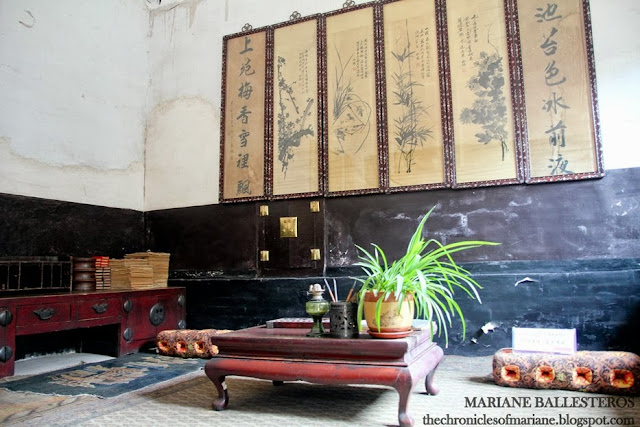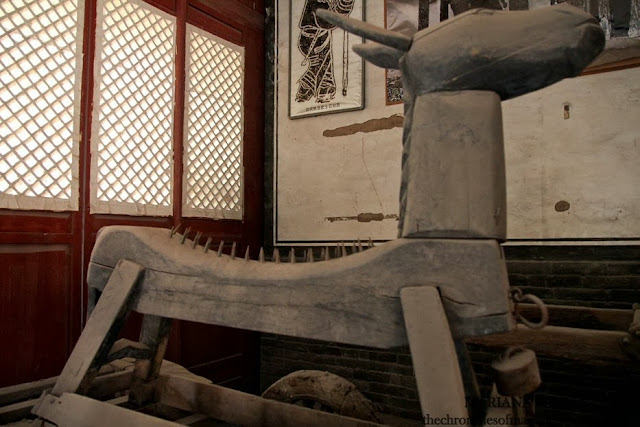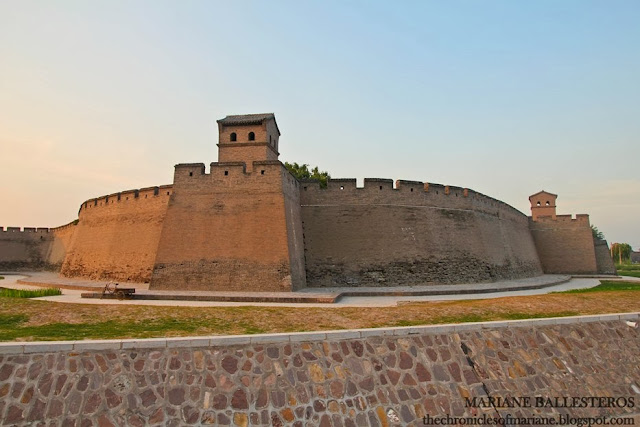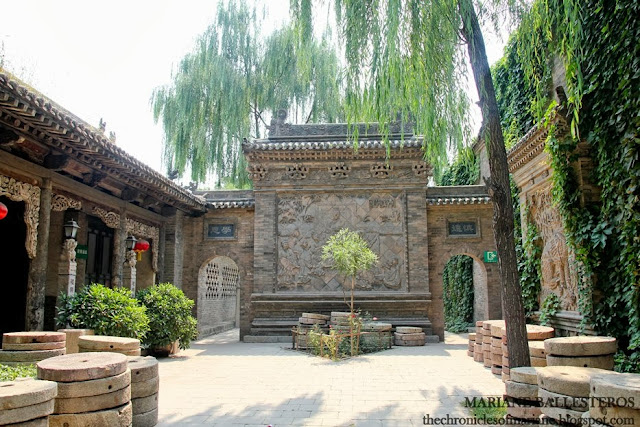There are tons of places that one could see inside the
ancient walled city of Pingyao (平遥), which is also why I wanted to stay in this place for 2 days and see everything that I can within this time. I allowed myself to absorb more of ancient Pingyao for a day by getting a map and buying the visitors pass ticket. Just looking at the map, planning to visit all the sights in this town would eat up more than two days as there are too many that one could see and explore. I squeezed all the recommended places in one go enjoy my flexible schedule.
 |
| Ancient City of Pingyao |
First off is something that is VERY hard to miss,
the city walls of Pingyao. Built during Zhou Dynasty, it stands 12 meter high and offers physical protection to the residents of the town. You could walk on top of the wall which offers a time of seclusion from the hustle and bustle and also a nice panoramic view of the town.
The Ancient Ming-Qing Street showcases old one-story residences and shops built with bricks and stones. It was fun to just walk around the area any time of the day to haggle souvenirs, taste authentic street food and peoplewatch.
 |
| streets of Pingyao by night |
I headed off to
Temple of the City God (城隍庙
Chénghuángmiào), located southeast of Pingyao. It is said to be one of the most preserved temples in the country so I was really anxious to see it.
The temple presents wonderful sculptures and paintings that I truly loved! Some parts looked kind of creepy actually, as some were gory that depicted the punishments in hell.
 |
| Temple of the City God |
 |
| Zhong Kui Temple feautures sculptures that depicts the punishments in hell. How gory and interesting! |
 |
| Three of the Six Cao Fu |
 |
| At the Kitchen God Temple, first time to see kitchenware and statues of human cooking in a temple |
 |
| lovely courtyard! |
 |
| Reincarnation Temple that celebrates the fertility god. |
I headed off to
Confucius Temple (文庙
Wénmiào) afterwards and it would have been nice to know about China's old system of education but there were no English texts for historical documents such as examination papers and calligraphy lessons which would have been great to understand as these were the only remains of 1300 years the Confucian Imperial Educational System.
 |
| old calligraphy texts |
 |
| pains of solo traveling, figuring out how you can take your own "selfies" |
After lunch, I went straight to
Rishengchang Draft Bank (日升昌
Rìshēngchāng), the pioneer of the exchange shops in China opened in the 18th century, marking the foundation of the country's financial system. The area is well-maintained and they even added manequins to make the atmosphere almost near to reality. The architecture of the courtyards, furniture and magnificent designs are sure to make even someone who was least interested about banks enjoy the place.
 |
| the mannequins add a color inside the bank, frankly I don't think I'd enjoy it here if not for these nice additions |
 |
| reception area for the guests |
 |
| staff bedroom |
 |
| traditional Chinese kang bed |
With all the banks and businesses present in the city, it was no argue that security must be heightened and armed escort agencies were developed.
The First Museum of Armed Escort in North China (中国镖局博物馆
Zhōngguó biāojú bówùguǎn) provided a great outlook of the security and escort service being provideded during the olden times. It was pretty cool to see equipment used by these armed escorts or
biaohang and it is like being inside a kung fu master's house.
 |
| different weapons of the escorts |
 |
| imagine how difficult it could be to wear this heavy armor |
 |
| you can try out shooting arrows but for a fee |
 |
| traditional dumbbells |
Last off my list is the most interesting of all,
Pingyao County Government Office (衙门
Yámén) that served as local government office for the county. The entire complex introduces beautiful courtyards and gardens, if I didn’t know it was a government compound, I would have mistaken it for a mansion of a rich merchant.
One could spend more than an hour exploring to what seems like a big maze of simple yet magnificent buildings and learn about Pingyao’s traditional government, history and way of living.
Be sure to make time of the court trial performances held here at these schedules:
Sat- Sun: 9:30, 11:00, 3:30, 4:50
Mon-Fri: 9:30, 11:00, 3:30
 |
| old way of living in Pingyao |
 |
| the judge in this play |
 |
| very realistic court performance! |
 |
| the Prison's courtyard |
 |
| old prison rooms |
 |
| these equipments were used for punishing prisoners, so morbid! |
There are also some places you can go outside of city walls which are recommended to visit with your own transportation since it is very far. I was able to go to Shuanglin Temple, Wang Family Courtyard and Zhangbi Castle that I will talk about on
another post.
Pingyao offers interesting sights to see, though it would probably be better to have a guidebook or translator in English. Nevertheless, I totally enjoyed this exploration of Pingyao and I can say that the trip here was one of my favorites so far in China.
Day 1: Datong
City Tour

|
Day 2: Datong
Yungang Grottoes

Hanging Monastery

|
Day 3: Pingyao
City Tour

|
Day 4: Pingyao
City Tour and Attractions

|
Day 5: Pingyao
Architecture/Art

|
Day 6: Xi'An
City Tour

|
Day 7: Xi'An
Yangling Mausoleum

|
Day 8: Xi'An
Terracotta Army

|
Day 9: Beijing
Qianmen Street/798 Art District

|
Day 10: Beijing
Nanluoguxiang/
Wangfujing

Tiananmen/
Forbidden City

|
Day 11: Beijing
Summer Palace

|
Day 12: Beijing
Great Wall

|
Railway Train Experience
Standing, Hard Seats, Sleepers

|
12 Day Trip
Itinerary & Budget
.jpg)
|
More of China here























































.jpg)
Hi Mariane,
ReplyDeleteThank you for sharing the story and the photos! I found your site while researching my own visit in Pingyao.
One small correction: while the city is indeed dating back to the Zhou dynasty, the city walls that we can see now are from 1370 AD (Ming dynasty). That's still very old, but it's ~2000 years more recent than Zhou period. Source: https://en.wikipedia.org/wiki/Pingyao_County and what I remember from the guide.
Chris